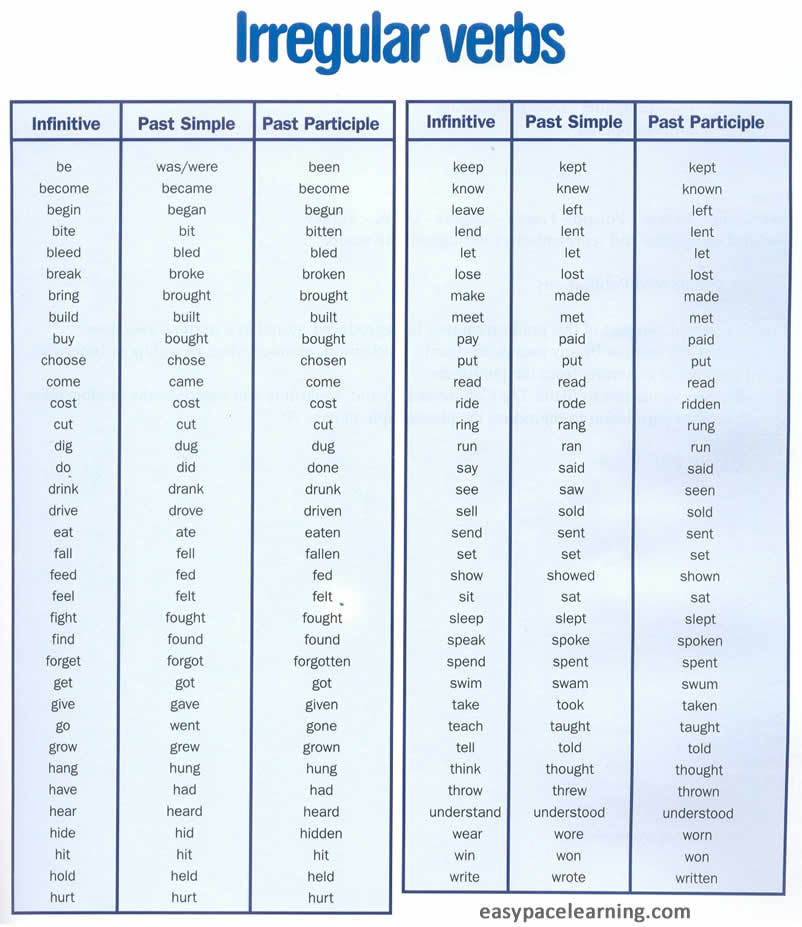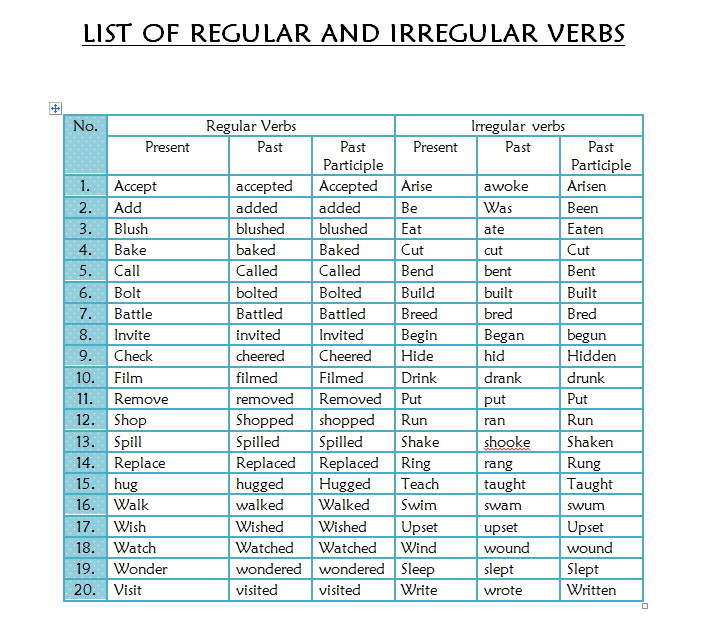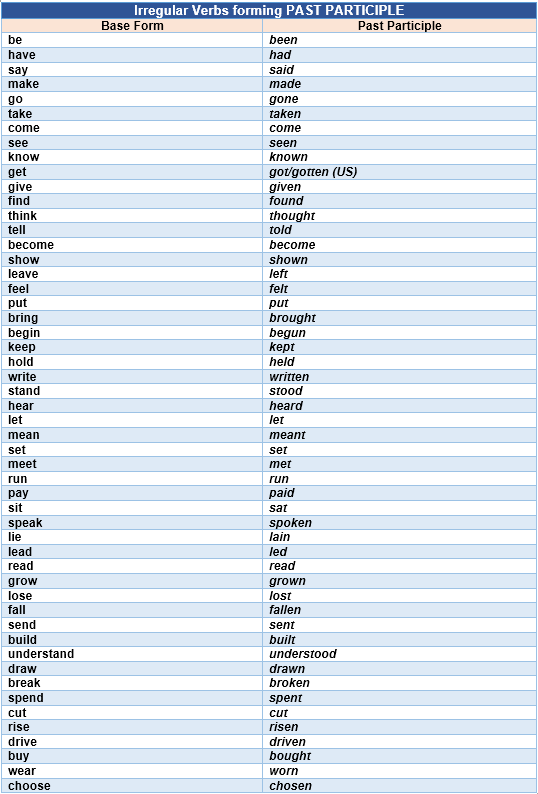The past participle of these verbs is really easy; its just the same as it is in the present and the past. Some examples might be: I ve just put away the groceries. Identify the past tense and participle verb forms of common verbs: awake lay. In traditional English grammar, a participle is a verbal that typically ends in ing (the present participle) or ed (the past participle). By itself, a participle can function as an adjective (as in the sleeping baby or the damaged pump). T he Par t i ci pl e Recognize a participle when you see one. Participles come in two varieties: past and present. They are two of the five forms or principal parts that every verb has. Below is the complete Irregular Verbs (Past Participle) word list containing 326 individual words. Click on a word to discover related lexical and grammatical information. Click on a word to discover related lexical and grammatical information. This is a reference page for list verb forms in present, past and participle tenses. Past perfect tense English If we conjugate the verb 'to go' as an example in the past perfect tense we're going to have: Subject had gone ( past participle of 'to go' ). Simple Past Tense, Past Participles To Be Past Tense English Teacher Resource If you found this List of Irregular Verbs in English interesting or useful, let others know about it. Three complete exercises on the past simplepast participle forms of the most common verbs in English. It includes a worsearch, exercises, fill. For each verb listed, the citation form (the bare infinitive) is given first, with a link to the relevant Wiktionary entry. This is followed by the simple past tense (), and then the past participle. If there are irregular present tense forms (see below), these are given in parentheses after the infinitive. (The present participle and gerund forms of verbs, ending in. The Past Simple Definition The Past Simple tense, also called the Simple Past, is used for past actions that happened either at a spe. Find this Pin and more on Spanish Verbs by Lourdes Saks. The past perfect is a verb tense which is used to show that an action took place once or many times before another point in the past. Read on for detailed descriptions, examples, and. el past participle (Participio pasado, que se utiliza en el tiempo Present Perfect, por ejemplo: I have broken a glass) su traduccin al espaol Los verbos regulares forman el Simple Past y el Past Participle agregando ed al infinitivo. To form the past participle of regular verbs, follow the same rules as for the past simple tense above. To make the present participle of regular verbs: If the basic form of the verb ends in a consonant or a vowel other than e, add the ending ing (e. Good examples of irregular verbs include have, understand and draw. Notice that their past forms had, understood and drew are very different from regular verbs, which end with d or ed. For more examples, see Englishpage. Showing top 8 worksheets in the category Present And Past Participle. Some of the worksheets displayed are Irregular past participle verbs, Present past and future tenses, Topic verbs, Participles, Irregular past participles, Past tense verb forms irregular, The perfect tenses review, T he par t i ci pl e. verbs that dont follow the basic rules are called irregular verbs. The past tense and past participle of regular verbs can be formed by adding ed to the end of the verb root. This is a list of over 180 common English irregular verbs, with their past simple and past participle forms. el past participle (Participio pasado, que se utiliza en el tiempo Present Perfect, por ejemplo: I have broken a glass) su traduccin al espaol Los verbos regulares forman el Simple Past y el Past Participle agregando ed al infinitivo. Present, Past and Past Participle Verbs. 2 (494 votes) Mon, 07: 51 Chris McCarthy Hide is the present tense, hid is the past simple and hidden is the past participle form of the verb. Have you ever flown in a helicopter? I'd love to learn how to fly one. Flown is the past participle of fly. The third column is the past participle, which is combined with has (singular) or have (plural) to form the present perfect tense. The past participle is also used with had to form the past perfect tense. This video shows irregular verbs in the simple form, the past tense, and as past participles. I hope this helps my students remember how these verbs change. It might also help with pronunciation. Regular Verbs form the past and past participle by adding d or ed to the present form. Two of the verbs in the table above are regular verbs. Participles can be used as adjectives. Complete the following sentences using appropriate present participle or past participle forms. Regular Verbs with sound of t 1 Regular Verbs Simple Present, Simple Past and Present Perfect Tenses This is a list of Regular Verbs. These verbs use ed for the simple past tense and the past participle. The ed ending sounds like t I will read the base form, the simple past tense and the past participle of the verb. List of verbs simple past and past participle 1. A SPANISHInfinitive Simple Past Past Participleabide abided abode abidedalight alighted alit alighted alitarise arose arisenawake awakened awoke awakened awokenBbackbite backbit backbittenbackslide backslid backslidden backslidbe [ am, is, are was, were been SERESTARbear bore born bornebeat beat beaten beatbecome became. Past tense and past participle of irregular verbs exercise 13. Write the past forms and past participles of these verbs. awake: become: bet: break: burn: catch: BACK to Present perfect simple continuous exercises with answers and grammar rules. The past participle helps form the present perfect tense because this tense spans both the past and present. Regular past participles are formed by adding ed to the verb. The Search and Rescue team has recovered four lost hikers this year. Irregular Verbs 1 Irregular Verbs Simple Present, Simple Past and Present Perfect Tenses This is a list of Irregular Verbs. I will read the base form, the simple past tense and the past participle of Past simple or past participle Complete the sentences with the past simple or past participle. Or they will use the past tense instead of the correct past participle: We could have went to the movie. Cold chills run up the spines of listeners who are grammatically aware. Naturally, people cant make this mistake with regular verbs, because the past tense and the past participles are the same. Complete 638 English Irregular Verbs List. This is the most complete list of English irregular verbs available on internet. It contains total 638 English irregular verbs with present participle (ing form of verb), simple past and past participle tense forms. The best resource and help for ESL, EFL and English students and teachers. We have free English lessons, free lesson plans and can correct your essays. This chart contains a list of the most common irregular verbs in English and their various forms, arranged according to type. Present root Present participle Past root Past participle Regular verbs (past root and past participles are the same; both end in ed) jump jumping jumped jumped Irregular verbs Type 1 (past root and [ When to use the simple past tense. We use the simple past tense for actions that began and finished in the past. We do not have to say exactly when. Past Participles in Participle Phrases Past participles can often be found in participle phrases. A participle phrase acts like an adjective. In the examples below, the participle phrases are shaded and the past participles are in bold. Past participle definition is a participle that typically expresses completed action, that is traditionally one of the principal parts of the verb, and that is traditionally used in English in the formation of perfect tenses in the active voice and of all tenses in the passive voice. I rregular verbs in infinitive past simple and past participle. All verbs, whether they are regular or irregular, have five forms. The forms are the infinitive, Infinitive, past simple, past participle, infinitive and. List of Irregular Verbs Base form past simple past participle abide abode abode arise arose arisen awake awoke awoken Can you name the English Verbs: Present Simple, Past Simple, Past Participle? Can you name the English Verbs: Present Simple, Past Simple, Past Participle? Test your knowledge on this language quiz to see how you do and compare your score to others. Quiz by samuelww Essential Verbs (German) 6; Top User Quizzes in Language. Past participles are used with simple perfect tenses (continuous perfect or progressive perfect tenses take the participle 'been' the present participle have been playing, will have been working, etc. Learn past participle conjugation verbs present with free interactive flashcards. Choose from 500 different sets of past participle conjugation verbs present flashcards on Quizlet. Simple past and past participle tense of regular and irregular verbs in English. Present participles are formed from verbs. Present participles (just like past participles) can be used as adjectives or used to form verb tenses. For example: The verb: to laugh The present participle: laughing The present participle used as an adjective: The laughing boy The present participle used to form a verb tense: The boy was laughing. The past participle is often used when we want to express a passive action. In English we add ed to the infinitive of regular verbs. We use the 3rd column of the table of the irregular verbs. This chart is presented to you courtesy of. the premiere Web site for English students and teachers. Simple Present List of 616 English Irregular Verbs From UsingEnglish. com A comprehensive list of 616 English irregular verbs, including their base form, past simple, past participle and definitions. Click on Show Forms to see the 3rd person singular and the present participle instead of the definitions. If you click on Show Groups, you will see the. Students write the past tense and the past participle of verbs. Is editable, BW version and answer key included. 1, 859 Downloads Irregular verbs groups. This is a simple grammar list of irregular verbs that are grouped according to similar formation of their past tense form. A study of these forms will show that: 1. The verbs in the first list form their past tense and past participle by adding d or ed to the present form of the verb. We see that the past tense and past participle of the verb3 in the second list are not formed by adding d or ed to the present. Learn verbs list irregular present participle tense past spanish with free interactive flashcards. Choose from 500 different sets of verbs list irregular present participle tense past spanish flashcards on Quizlet..











